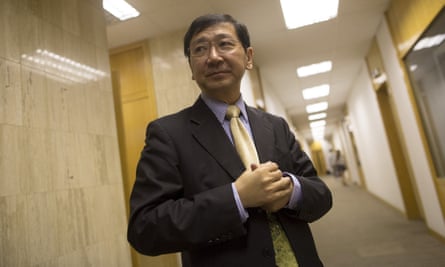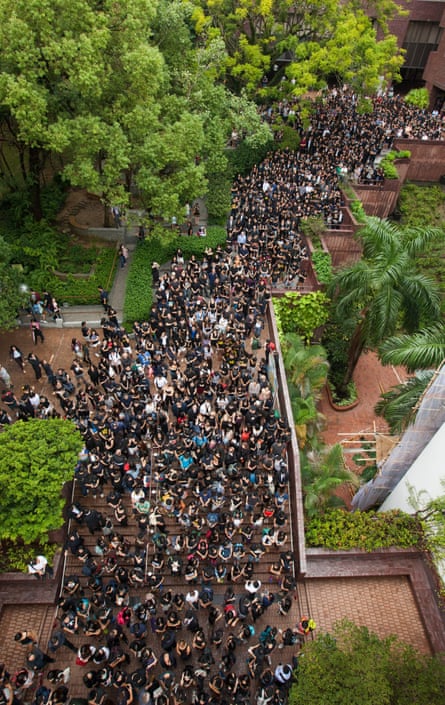More than 1,000 students and faculty members have marched through one of Hong Kong’s leading universities in silence to protest against what they describe as an intensifying Beijing-backed assault on academic freedoms.
The demonstration at the University of Hong Kong came after its governing council took the controversial step of blocking a liberal law professor, Johannes Chan, from becoming its pro-vice-chancellor on 29 September. The council voted down the appointment of Chan, who is the former dean of the university’s law school, by 12 votes to eight.
Chan’s supporters, many of whom wore black at the march on Tuesday, claim the move was punishment for his ties to the former British colony’s pro-democracy movement and in particular to Benny Tai, a law professor at the university who helped launch last year’s umbrella movement protests.
Timothy O’Leary, the head of the university’s school of humanities and one of the march’s organisers, described the council’s move to block Chan’s appointment as “an absolute disgrace”. “All we can conclude is that they have blocked it for political reasons and that is completely unacceptable,” he said.

O’Leary said he believed political leaders in both Hong Kong and Beijing were exacting revenge on the university because of the prominent role some of its students and staff had played in last year’s pro-democracy protests. He added: “They want to send a clear message to the University of Hong Kong that we should shut up and not cause trouble.”
O’Leary claimed there was strong evidence that officials from Beijing’s liaison office in Hong Kong had put pressure on council members to block Chan’s appointment. He said the intended message to students or academics inclined to support protests was: “This will not be tolerated.”
“It is already having this very chilling effect – people are afraid,” O’Leary added. He said one junior academic, fearing reprisals, had written to him saying: “Is it really safe if I come to this protest march?”
Tuesday’s march came just days after Hong Kong marked the one-year anniversary of the pro-democracy demonstrations. The protests saw students launch a 79-day occupation of the city’s financial centre, with more than 100,000 people taking to the streets to demand genuine universal suffrage for Hong Kong.

Pro-Beijing newspapers in Hong Kong have launched repeated attacks on Chan. China’s state-run Global Times accused the law professor of being a “ringleader” of Occupy Central, the original protest group that spawned the umbrella movement.
Speaking to the New York Times last week, Chan described himself as a “rather moderate, liberal person”. He said he was “puzzled” at the university council’s opposition to his appointment.
Chan described an increasingly politicised atmosphere on campus, with academics expressing growing nervousness over their ability to speak openly without damaging their careers.
“There are people who are worried about how far they can still comment on public affairs, particularly those who work in humanities,” Chan said. “I have junior colleagues coming to me saying: ‘I don’t know really know whether I can still write about this or not.’”
Sebastian Veg, a Hong Kong-based professor from the Centre for the Study of Modern and Contemporary China in Paris, admitted there was no “smoking gun” to prove direct political interference in Chan’s case.
But he pointed out that the university council was stacked with Beijing loyalists, including several who were members of China’s rubber-stamp parliament, the National People’s Congress.
Veg, who is also an honorary assistant professor at the University of Hong Kong, said he, too, sensed a growing erosion of academic freedoms. “There is a creeping feeling that promotions are not made on the basis of academic merit, that maybe grants are not given on the basis of academic merit, or at least that is the suspicion,” he said. “That is the beginning of where academic freedom starts to run into trouble.”
O’Leary said many liberal scholars now felt they were on the frontline of a battle to preserve academic freedom and urged others to speak out.
“The consequence [of remaining silent] is just the spreading and intensifying of a climate of fear, self-censorship and caution. People will just accept that they have to change how they speak, how they work and how they act in public,” he said.
“For a university to be a great university you need institutional autonomy and academic freedom. We are losing the autonomy and we know the next thing is the academic freedom. Once that happens you are in serious trouble.”
A second protest is planned for Friday.

Comments (…)
Sign in or create your Guardian account to join the discussion